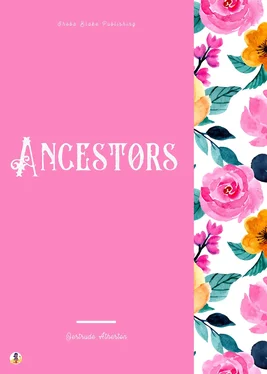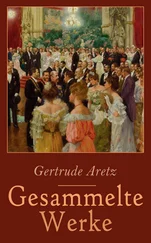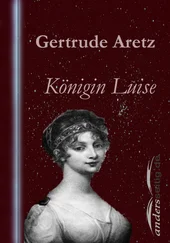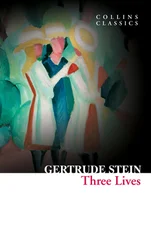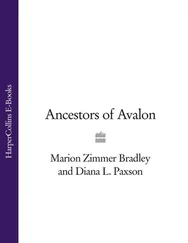Gertrude Atherton - Ancestors
Здесь есть возможность читать онлайн «Gertrude Atherton - Ancestors» — ознакомительный отрывок электронной книги совершенно бесплатно, а после прочтения отрывка купить полную версию. В некоторых случаях можно слушать аудио, скачать через торрент в формате fb2 и присутствует краткое содержание. Жанр: unrecognised, на английском языке. Описание произведения, (предисловие) а так же отзывы посетителей доступны на портале библиотеки ЛибКат.
- Название:Ancestors
- Автор:
- Жанр:
- Год:неизвестен
- ISBN:нет данных
- Рейтинг книги:3 / 5. Голосов: 1
-
Избранное:Добавить в избранное
- Отзывы:
-
Ваша оценка:
- 60
- 1
- 2
- 3
- 4
- 5
Ancestors: краткое содержание, описание и аннотация
Предлагаем к чтению аннотацию, описание, краткое содержание или предисловие (зависит от того, что написал сам автор книги «Ancestors»). Если вы не нашли необходимую информацию о книге — напишите в комментариях, мы постараемся отыскать её.
Ancestors — читать онлайн ознакомительный отрывок
Ниже представлен текст книги, разбитый по страницам. Система сохранения места последней прочитанной страницы, позволяет с удобством читать онлайн бесплатно книгу «Ancestors», без необходимости каждый раз заново искать на чём Вы остановились. Поставьте закладку, и сможете в любой момент перейти на страницу, на которой закончили чтение.
Интервал:
Закладка:
“Oh no!” Mrs. Kaye’s bright color had darkened. “On the contrary, the English are always rather amused at American distinctions. It only happens that all my friends are New-Yorkers.”
She was a very clever woman, for snobbery had blunted and demoralized only one small chamber of her brain, and she had as comprehensive a knowledge of the world as any woman in it. Nevertheless, as her powerful magnetic eyes met the ingenuous orbs opposite, she was unable to determine whether the barbed words, quivering in a sore spot, had been uttered in innocence or intent. “Of course one doesn’t meet so many Americans, after all. Naturally, the New-Yorkers bring the best letters.” She paused a moment as if ruminating, then delivered herself of an epigram: “New York is the great American invention for separating the wheat from the tares.”
“Indeed!” Isabel was too surprised to strike back.
“It is well known that it is one of the most exclusive social bodies in the world. You have far less difficulty over here.”
“That may be merely owing to the fear that affects all new social bodies. I have the honor to know the leader of society in St. Peter—a town of ten thousand inhabitants near my own—and she is frightfully exclusive. She is so afraid of knowing the wrong sort of people that she is barely on nodding terms with the several thousand new-comers that have added to the wealth and importance of the town during the last ten years. Consequently, her circle is as dull as an Anglo-Saxon Sunday. I fancy the same may be said of New York, for its fashionable set is not large and its interests are far from various. From all I have heard, London society alone is perennially interesting, and the reason is, that, absolutely secure, it keeps itself from staleness by constantly refreshing its veins with new blood, exclusive only against offensiveness. Of course you are a daughter of a duke or something,” she added, wickedly. “Everybody here seems to be. Don’t you feel that your ancestors have given you the right to know whom you please?—instead of eternally plugging the holes in the dike.”
In spite of her sharpened wits, Mrs. Kaye smiled radiantly into Isabel’s guileless eyes. “I am not the daughter of a duke; I wish I were!” she exclaimed, with a fair assumption of aristocratic frankness. “But your point is quite correct.” Again she appeared to ruminate; then added: “The British aristocracy is to society what God is to the world—all-sufficient, all-merciful, all-powerful.”
“And she would sacrifice Him and all his archangels to an epigram,” thought Isabel, who was somewhat shocked. “How fearfully clever you are!” she murmured. “Do you think in epigrams?”
“Epigrams? Have I made one? I wish I could. They are immensely the fashion.”
“I should think you might have set it—”
She did not finish her sentence, for the ear to which it was addressed suddenly closed. Lady Cecilia Spence had sauntered up, and Mrs. Kaye hastily made room for her on the sofa, turning a shoulder upon Isabel. A faint change, as by the agitation of depths on the far surface of waters, rippled her features, and Isabel, summoning the impersonal attitude, watched her curiously. It was her first experience of the snob in a grandiose setting, but it was the type that had aroused her most impassioned inward protest all her life: the smallest circles have their snobs, and, like all the unchosen of mammon, she had had her corroding experiences. But her high spirit resented the power of the baser influences, and, with her intellect, commanded her to accept the world with philosophy and the unsheathed weapon of self-respect. In the present stage of the world’s development it was to be expected that the pettier characteristics of human nature would predominate; and perhaps the intellectually exclusive would not have it otherwise.
Mrs. Kaye, polite tolerance giving place to the accent of intimacy, began: “Oh, Lady Cecilia, have you heard—” and plunged into a piece of gossip, no doubt of absorbing interest to those that knew the contributory circumstances and the surnames of the actors, but to the uninitiated as puzzling as success. Lady Cecilia’s eyes twinkled appreciatively, and her wells of laughter bubbled close to the surface. Isabel, completely ignored, waited until the story was finished, and then made a deliberate move.
“How interesting!” she exclaimed. “Won’t you tell me the names of the people?”
Mrs. Kaye, without turning her head, murmured something indistinctly, and lit another cigarette. “Won’t you have a light, Lady Cecilia?” she asked.
“Please give me one,” said Isabel, sweetly. She reached out and took the cigarette from Mrs. Kaye’s faintly resisting hand. “Thank you. I am lazy about looking for matches. Do you smoke a lot?”
But Mrs. Kaye, irritated, or having reached the conclusion that the newcomer was not in the very least worth while, said with soft fervor to her who was: “How delightful that dear Jack was returned! Of course you are as interested in his career as the rest of us.”
“I should be a good deal more so if his mother had turned him across her knee a little oftener—or if I could shake him myself occasionally.”
Isabel, satisfied, more amazed than ever at the infantile ingenuousness of the snob, rose, and was about to turn away when she met Lady Cecilia’s eyes. They were full of amusement, and there was no mistaking its purport. In a flash Isabel had responded with a challenge of appeal, which that accomplished dame was quick to understand.
“Please don’t go,” she said. “I came over here to talk to you. We are all so interested in the idea that Vicky is half an American—we had quite forgotten it. Did you ever see any one look less as if she had American cousins than Vicky? She might easily have a whole tribe of Spanish ones.”
“Well, she has, in a way.” And in response to many questions Isabel found herself relating the story of Rezánov and Concha Argüello, while Mrs. Kaye, whatever may have been her sensations, rose with an absent smile and composedly transferred herself to an equally distinguished neighborhood.
“I wonder if she has ever tried to condense rudeness into an epigram,” said Isabel viciously, pausing in her narrative.
Lady Cecilia shook expressively. “At least she has not made an art of it,” she said. “They never do.”
VI

The next morning, Isabel, after little sleep, rose early and went out for a walk. She had sat up until eleven, listening to the puzzling jets of conversation, or watching the Bridge-players, and when she had finally reached her room, tired and excited, Flora Thangue had come in for a last cigarette and half an hour of chat. Her first evening in the new world had had its clouded moments, for it was impossible not to feel the alien, and the kindness of English people, no matter how deep, is casual in expression. But on the whole she had felt more girlishly happy and ebullient than since her sister had gone her own way and left a heavy burden for young shoulders behind her. In the freedom of a girl in Europe, no matter how prized, there is much of loneliness in idleness, a constant attitude of defence, moments of bitter wonder and disgust, and, to the analytical mind, an encroaching dread of a more normal future with a chronic canker of discontent.
Isabel had by no means passed her European years in the procession that winds from the Tiber to the Seine, prostrating itself at each successive station of architecture or canvas; nor even devoted the major portion of her time to the investigation of the native, deeply as the varying types had interested her. Her intellectual ambition, as is often the case with the American provincial girl, had been even stronger than her desire for liberty and pleasure, and she had spent several months with the archæological society of Rome, read deeply in Italian history and art, attended lectures at the Sorbonne, and spent nearly a year in Berlin, Dresden, Munich, and Vienna, studying that modern stronghold of dramatic literature, the German Theatre.
Читать дальшеИнтервал:
Закладка:
Похожие книги на «Ancestors»
Представляем Вашему вниманию похожие книги на «Ancestors» списком для выбора. Мы отобрали схожую по названию и смыслу литературу в надежде предоставить читателям больше вариантов отыскать новые, интересные, ещё непрочитанные произведения.
Обсуждение, отзывы о книге «Ancestors» и просто собственные мнения читателей. Оставьте ваши комментарии, напишите, что Вы думаете о произведении, его смысле или главных героях. Укажите что конкретно понравилось, а что нет, и почему Вы так считаете.
